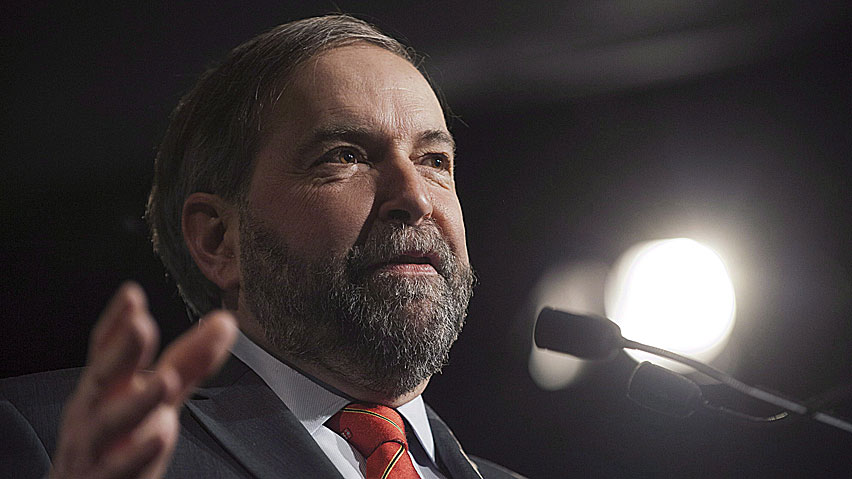
Controversy surrounds Mulcair’s visit to Washington
NDP leader Thomas Mulcair and Prime Minister Stephen Harper are exchanging fire over speeches Mulcair recently made to the business community in Washington and New York that outlines a critical view of the current direction of the current government. Harper claims Mulcair is “trash talking” Canada while Mulcair points to Harper’s past. Meanwhile, how true is Mulcair’s pitch about the banking system?
Harper has accused Mulcair of “trash talking” Canada at the conference and Mulcair has fired back saying that he has nothing to learn from Harper about that.
“All of a sudden there’s a rule that they’ve decided that you’re not supposed to talk about the government (while abroad) now that they’re the government but when they were the Opposition there was no problem talking about the government,” Mulcair said.
“So people can take that with a grain of salt.”
Oh the irony, Harper’s track record of remarks is quite insulting to most Canadians and cannot come close to matching Mulcair’s concerns about the XL Pipeline deal.
When Harper was the official Opposition to Jean Chretien’s Liberal government, he co-wrote an article in the Wall Street Journal in 2003 which called Chretien’s stand against the war in Iraq as a “serious mistake.”
“For the first time in history, the Canadian government has not stood beside its key British and American allies in their time of need,” he wrote.
We remember that no weapons of mass destruction were found in Iraq and the price of the war entered the trillions.
In Montreal, Harper gave his notorious speech to American businessmen painting Canada as “a northern European welfare state in the worst sense of the term.”
Mulcair’s speech at the Woodrow Wilson Center in Washington didn’t have the sharp tongue that Harper had as official opposition back in the day, but its factual basis can be torn apart.
“Canada was not immune to the siren call of financial deregulation that swept across the rest of the developed world just over a decade ago. In the 1990’s, Canada’s Liberal and Conservative parties alike joined the chorus. It was only New Democrats who held the anchor tight against the calls for radical deregulation,” Mulcair said.
It is worth noting that the NDP of the time voted with the Reform to reject the changes that the Liberal government made which kept our banks out of the same kind of deregulated trouble that exists in the United States today.
On April 26, 1993, the NDP joined the Reform Party to vote against granting the Office of the Superintendent of Financial Institutions new powers to enhance the safety and soundness of the Canadian financial system as was proposed by Bill C-15, Division 39.
On February 13, 2001, the NDP stood alone to vote against Bill C-8 Division 7 which proposed the creation of the Financial Consumer Agency of Canada.
During the early 1990s and early 2000s, the NDP actually endorsed the American-style banking system and pushed for it in the House of Commons and in their platforms – take for example the platform of 1997.
“Canada’s NDP say it’s time to stand up to the banks on behalf of consumers and small business people. We will fight for: A Community Reinvestment Act, similar to laws already in effect in the United States.”
National Bureau of Economic Research, a leading American think tank, reviewed the Community Reinvestment Act and published a report in October 2012 called “Did the Community Reinvestment Act (CRA) Lead to Risky Lending?” In it, the risk-level of such a system to the economy was assessed.
“Did the Community Reinvestment Act (CRA) Lead to Risky Lending? Yes, it did…. We find that adherence to the act led to riskier lending by banks: in the six quarters surrounding the CRA exams lending is elevated on average by about 5 percent every quarter and loans in these quarters default by about 15 percent more often. These patterns are accentuated in CRA-eligible census tracts and are concentrated among large banks.”
While Stephen Harper and Thomas Mulcair attack each other about their speeches as former and current Official Opposition leaders, one thing is clear: neither were right at the time and neither are right now.
So that leaves the question to you: Do you think both Harper and Mulcair are wrong over the way they handled Mulcair’s business trip to Washington this week?



